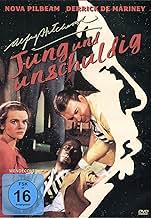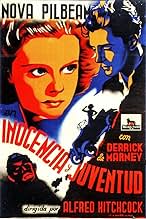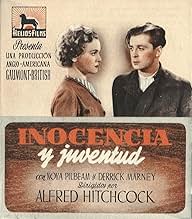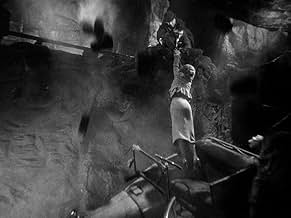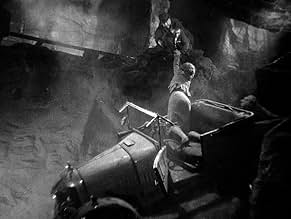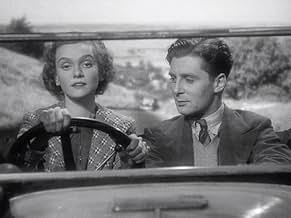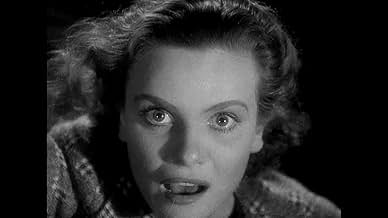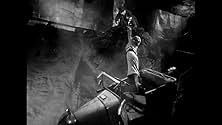A man on the run from a murder charge enlists the help of a beautiful stranger who must put herself at risk for his cause.A man on the run from a murder charge enlists the help of a beautiful stranger who must put herself at risk for his cause.A man on the run from a murder charge enlists the help of a beautiful stranger who must put herself at risk for his cause.
- Awards
- 1 win total
Derrick De Marney
- Robert Tisdall
- (as Derrick de Marney)
Frank Atkinson
- Petrol Pump Attendant
- (uncredited)
Clive Baxter
- Burgoyne Boy
- (uncredited)
Pamela Bevan
- Little Girl at Party
- (uncredited)
Ernest Borrow
- Policeman Outside Courtroom
- (uncredited)
6.811.8K
1
2
3
4
5
6
7
8
9
10
Featured reviews
May I Have Another Attorney, Please!
Aside from the suspense, there are several notable scenes. Two minutes into things, and a man opens a front door. Suddenly facing us just beyond the railing is a roiling wall of water, an angry sea about to pour over us. I grabbed my seat cushion, hoping it would float. Then there's the flop house full of snoring vagrants, dead cockroaches, and peeling paint. Right away, I reached past my highball glass and took the wife's Coke. Topping that, is the drive into the mine tunnel. It's a marvel of special effects and timing, with an effect as stunning, I believe, as anything in today's digitally drenched cinema. Nonetheless, I checked the garage to make sure my car was still on all fours. The final scene was a contrast since I'd just watched a 40's musical with wild-man drummer Gene Krupa. Here, it's like watching a wind-up toy slowly losing its mind.
Nova Pilbeam is not exactly a glamor girl, with her over-sized brow and snub nose; still and all, for an 18 -year old she's one heck of an actress. This is a pretty slender exercise for Hitchcock, nothing terribly profound and a lot like The Thirty-Nine steps of two years before. Too bad De Marney doesn't generate the kind of charisma or sympathy the Robert Donat part calls for. Hitchcock was to plow this furrow of racing against the law a number of times. Here, it's Pilbeam going against her civic duty and constable father to help prove accused murderer De Marney's innocence. Their bond of trust grows over time, showing once more that young love often sees what the law cannot-- at least as far as the movies are concerned.
This may not be top-flight Hitchcock. Still, there are the usual humorous touches, darkly suggestive moments, and imaginative moves with the camera. So if you've got a spare hour and half, see why England should never have allowed that funny looking, fat guy an exit visa.
Nova Pilbeam is not exactly a glamor girl, with her over-sized brow and snub nose; still and all, for an 18 -year old she's one heck of an actress. This is a pretty slender exercise for Hitchcock, nothing terribly profound and a lot like The Thirty-Nine steps of two years before. Too bad De Marney doesn't generate the kind of charisma or sympathy the Robert Donat part calls for. Hitchcock was to plow this furrow of racing against the law a number of times. Here, it's Pilbeam going against her civic duty and constable father to help prove accused murderer De Marney's innocence. Their bond of trust grows over time, showing once more that young love often sees what the law cannot-- at least as far as the movies are concerned.
This may not be top-flight Hitchcock. Still, there are the usual humorous touches, darkly suggestive moments, and imaginative moves with the camera. So if you've got a spare hour and half, see why England should never have allowed that funny looking, fat guy an exit visa.
Early and Delectable
Sort of a blueprint for any number of later, more bloated Hitchcocks: The man falsely accused of murder; the sympathetic miss who helps him, the set pieces in creepy places. This one has a lighter, more picaresque feel than most of the Master's movies, with irrelevant but diverting supporting characters, Maguffins, an unstarry cast, and an unusual dollop of humor. It's also blessed by a screenplay that leaps nimbly from improbability to improbability, as much as its more famous contemporaries, like "The 39 Steps" or "The Lady Vanishes."
The light tone throughout tips us off that everything's going to turn out all right, so there's less suspense than we associate with Hitchcock. Still, it's beautifully photographed (with one really stunning crane shot), beautifully paced, and enjoyably acted. The unstoried Nova Pilbeam is a standout: She's the ideal Hitchcock heroine, blonde, slender, and spirited.
The light tone throughout tips us off that everything's going to turn out all right, so there's less suspense than we associate with Hitchcock. Still, it's beautifully photographed (with one really stunning crane shot), beautifully paced, and enjoyably acted. The unstoried Nova Pilbeam is a standout: She's the ideal Hitchcock heroine, blonde, slender, and spirited.
Sweet, fast, joyous British Hitchcock...
Young and Innocent (1937)
The title is appropriate to the point of being redundant, because in nearly every Alfred Hitchcock film the key theme is an innocent man accused. In this case, accused of murder, and the young man is a charming English actor, Derrick De Marney. As the police begin their hunt, he runs into the police chief's daughter, played by Nova Pilbeam, a tomboyish answer to Katherine Hepburn, and the real star of the movie.
This is a late British Hitchcock film, and it feels slightly raw around the edges, but it's so fast and likable and well constructed, you have to love it. In fact, the suspense of getting caught is balanced by some downright slapstick scenes that are brief and hilarious. And a reminder that this is a romp, the whole thing a beautiful, spritely entertainment. Never mind a killer is on the loose, because if one man is innocent of murder, another, out there somewhere, it not.
This is 1937, and by 1939 Hitchcock has moved to the U.S. to do Hollywood movies (including the amazing Rebecca in 1940), and so Young and Innocent and The Lady Vanishes (which has a similar quaint feel) wrap up his long British period. It says a lot for a movie to say I could watch it again, not because it's technically astonishing, but because it's just a joy, and very sweet. Never mind a little corniness or an inevitable ending, it's good!
The title is appropriate to the point of being redundant, because in nearly every Alfred Hitchcock film the key theme is an innocent man accused. In this case, accused of murder, and the young man is a charming English actor, Derrick De Marney. As the police begin their hunt, he runs into the police chief's daughter, played by Nova Pilbeam, a tomboyish answer to Katherine Hepburn, and the real star of the movie.
This is a late British Hitchcock film, and it feels slightly raw around the edges, but it's so fast and likable and well constructed, you have to love it. In fact, the suspense of getting caught is balanced by some downright slapstick scenes that are brief and hilarious. And a reminder that this is a romp, the whole thing a beautiful, spritely entertainment. Never mind a killer is on the loose, because if one man is innocent of murder, another, out there somewhere, it not.
This is 1937, and by 1939 Hitchcock has moved to the U.S. to do Hollywood movies (including the amazing Rebecca in 1940), and so Young and Innocent and The Lady Vanishes (which has a similar quaint feel) wrap up his long British period. It says a lot for a movie to say I could watch it again, not because it's technically astonishing, but because it's just a joy, and very sweet. Never mind a little corniness or an inevitable ending, it's good!
Classic Hitchcock
Hitchcock is in a class by himself. I'll give any of his films multiple viewings. The story and structure of "Young and Innocent" resemble "The 39 Steps," with a young woman helping a young man on the run thwart the police and prove his innocence. This film is a standout, though, not because of the story or acting (both charming), but because of a virtuoso bit of directing by the Master, in which the location of the killer is revealed. As I watched the scene unfold for the first time, I remember thinking, "This is what makes Hitchcock Hitchcock." I wish I had never seen any Hitchcock films so I could watch them all again for the first time. His is a brilliant body of work, and this is an often overlooked example of his mastery of the film art.
Quintessential British Hitchcock
"Young and Innocent" is one of the best of Alfred Hitchcock's pre-Hollywood movies. It contains all of the features that characterized the finest of his British movies, and is (as many others have commented) a film often undeservedly overlooked amongst Hitchcock's large collection of classics.
The actors would all be unfamiliar to most contemporary American viewers, but it is a fine cast that does full justice to a good story, and that responds well to Hitchcock's expert direction. Derrick de Marney is engaging as the unjustly accused hero Robert Tisdall, and his character is balanced nicely by good performances from the rest of the cast (several of whom appeared in more than one of Hitchcock's British movies).
As is often the case with Hitchcock's British pictures, the title is capable of multiple interpretations. At the least, it could refer either to the hero, to the heroine, or to the overall atmosphere and themes of the movie. Young Tisdall is being chased by the law, but we know from the beginning that he is innocent, and his knowledge of that innocence enables him to remain upbeat and even playful despite the dangers and complications he faces. Erica (Nova Pilbeam), his reluctant friend and helper, is innocent in a different sense. In the story she finds her youthful naivete, especially the assumptions she has acquired in growing up as a chief police constable's daughter, challenged by the real world - perhaps for the first time in her life. Pilbeam is not a glamorous heroine (and this may be one of the reasons why "Young and Innocent" is unjustly neglected), but she was a good choice to portray the youthful earnestness and resulting moral dilemmas of her character.
Despite the film's short length, it is filled with classic Hitchcock touches of detail, artistry, and humor, many of which are more low-key than those in his more familiar Hollywood films. It is worth watching several times in order to catch and appreciate all of the details. Three sequences are especially worth noting: (i) the renowned tracking shot at the climax of the film, which is not only a fine technical achievement but also an ideal way to set up the suspenseful conclusion; (ii) the birthday party in the middle, which encapsulates in very subtle ways most of the themes and contrasts of the movie, and (iii) the sequence towards the beginning involving the hero's conference with his lawyer, his court appearance, and his escape, a sequence which is filled with comic details too numerous to catch all at once (including one of the director's most humorous cameos).
Any Hitchcock fan should thoroughly enjoy "Young and Innocent". Beyond that, any fan of thrillers who can look past an unfamiliar cast, and who is willing to look for the subtle touches that characterized the great director's British work, will also find the film a satisfying experience.
The actors would all be unfamiliar to most contemporary American viewers, but it is a fine cast that does full justice to a good story, and that responds well to Hitchcock's expert direction. Derrick de Marney is engaging as the unjustly accused hero Robert Tisdall, and his character is balanced nicely by good performances from the rest of the cast (several of whom appeared in more than one of Hitchcock's British movies).
As is often the case with Hitchcock's British pictures, the title is capable of multiple interpretations. At the least, it could refer either to the hero, to the heroine, or to the overall atmosphere and themes of the movie. Young Tisdall is being chased by the law, but we know from the beginning that he is innocent, and his knowledge of that innocence enables him to remain upbeat and even playful despite the dangers and complications he faces. Erica (Nova Pilbeam), his reluctant friend and helper, is innocent in a different sense. In the story she finds her youthful naivete, especially the assumptions she has acquired in growing up as a chief police constable's daughter, challenged by the real world - perhaps for the first time in her life. Pilbeam is not a glamorous heroine (and this may be one of the reasons why "Young and Innocent" is unjustly neglected), but she was a good choice to portray the youthful earnestness and resulting moral dilemmas of her character.
Despite the film's short length, it is filled with classic Hitchcock touches of detail, artistry, and humor, many of which are more low-key than those in his more familiar Hollywood films. It is worth watching several times in order to catch and appreciate all of the details. Three sequences are especially worth noting: (i) the renowned tracking shot at the climax of the film, which is not only a fine technical achievement but also an ideal way to set up the suspenseful conclusion; (ii) the birthday party in the middle, which encapsulates in very subtle ways most of the themes and contrasts of the movie, and (iii) the sequence towards the beginning involving the hero's conference with his lawyer, his court appearance, and his escape, a sequence which is filled with comic details too numerous to catch all at once (including one of the director's most humorous cameos).
Any Hitchcock fan should thoroughly enjoy "Young and Innocent". Beyond that, any fan of thrillers who can look past an unfamiliar cast, and who is willing to look for the subtle touches that characterized the great director's British work, will also find the film a satisfying experience.
Did you know
- TriviaAlfred Hitchcock: Outside the courthouse holding a camera as Robert Tisdall (Derrick De Marney) escapes (at about 0:16:10).
- Goofs(at around 50 mins) When Erica Burgoyne and Robert Tisdall have taken refuge at night in a small town by parking her car next to a siding just before where the railroad underpasses a bridge, the entire scene has been staged and shot as an obvious miniature as revealed by three mistakes:
- the somewhat jerky motion and unnatural lighting of an automobile (indicating that it was pulled) as it moves across the bridge above the railroad
- the express train speeding under the bridge drags a length of cord behind it as it disappears from view
- the camera tracking in closer to the parked automobile hidden in the shelter of freight trains on sidings reveals that the figures of Erica and Robert are actually modeled and painted figurines, motionless until the shot suddenly changes to a medium closeup shot of the two actors.
- Quotes
[last lines]
Erica Burgoyne: Father, don't you think we ought to ask Mr. Tisdall to dinner?
- SoundtracksNo One Can Like the Drummer Man
(uncredited)
Written by Samuel Lerner (as Lerner), Al Goodhart (as Goodhart) and Al Hoffman (as Hoffman)
Details
Box office
- Gross worldwide
- $401
- Runtime
- 1h 23m(83 min)
- Color
- Aspect ratio
- 1.37 : 1
Contribute to this page
Suggest an edit or add missing content

